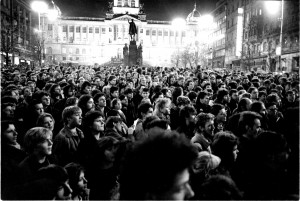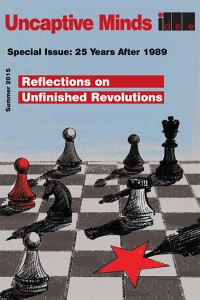IDEE Programs
Since its founding in 1985, IDEE has implemented more than one hundred publicly and privately funded programs that have directly supported several thousand publications, civic and human rights organizations, political groups, and opposition movements in twenty-five post-communist countries as well as Cuba. Many, like the Centers for Pluralism, Civic Bridges, Women in the Caucasus, and Democracy for Cuba, were multi-year programs with multiple small grant, training, exchange, educational, and publication features. These, in turn, have supported directly and indirectly thousands of local initiatives reaching tens of thousands of civic and democracy activists.
In the period of 1985 to 1991, IDEE supported the growing opposition, human rights, and independence movements in the communist dictatorships of the Soviet bloc countries. It carried out nearly 50 direct assistance programs for independent publications and groups at the heart of the 1989–91 revolutions in Central and Eastern Europe, the Baltic countries, Belarus and Ukraine. Since then, through Centers for Pluralism and other programs, IDEE helped democrats throughout the post-communist region in their efforts to dismantle communism’s legacy, build democratic institutions, foster a plural and open society, and combat the rise of authoritarian governments and anti-democratic forces in the region. IDEE is proud that its innovative programs created models in the region, such as small grants for independent media, East-East internships, regional networking (its Centers for Pluralism program was the model for the initial World Movement for Democracy), among others. Unlike many programs in the region, however, IDEE’s initiatives were without bureaucracy and relying on networks of individuals and groups with similar and shared values.
For the last twenty years, IDEE has focused particular attention on countries and regions where the fall of communism did not result in democratic transition but instead brought continued dictatorship or war, especially the Balkans, Belarus, the Caucasus and Central Asian countries, Chechnya, Crimea and Ukraine, as well as Cuba, the only country aligned with the Soviet Union to retain its repressive communist system. Descriptions of a number of IDEE’s programs from 1992 to 2012 may be found on the Programs Page of its original web site (www.idee.org). Also on its original web site are annual or bi-annual reports on its activities starting in 2000. IDEE has deposited its archives (from 1985-2013) at the Hoover Institution and as part of this effort will post additional materials related to its earlier programs on its current web site (idee-us.xsudikrnnx-xoy4wznlg4pw.p.temp-site.link).
In 2014, IDEE launched a new program, “25 Years After the 1989–91 Revolutions” an effort to assess the varied and different outcomes of those revolutions across the region and to develop ideas and strategies for taking on the unfinished business of that era. In a first step, IDEE gathered 22 veterans of the 1989-91 Revolutions and democratic movements for a unique seminar held in Warsaw in October 2014 around the 25th anniversary of the 1989 events. Out of the seminar, IDEE has published a Special Report, which includes a description of the findings and recommendations of the participants and summaries of the sessions, as well as a special issue of Uncaptive Minds, IDEE’s previous journal of information and analysis on the region published from 1988 to 1997, which includes the full proceedings (seminar papers, responses, and dialogue among participants). .





